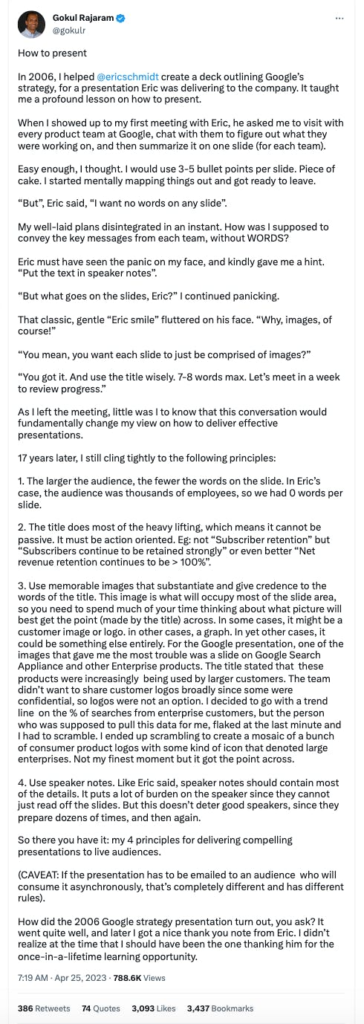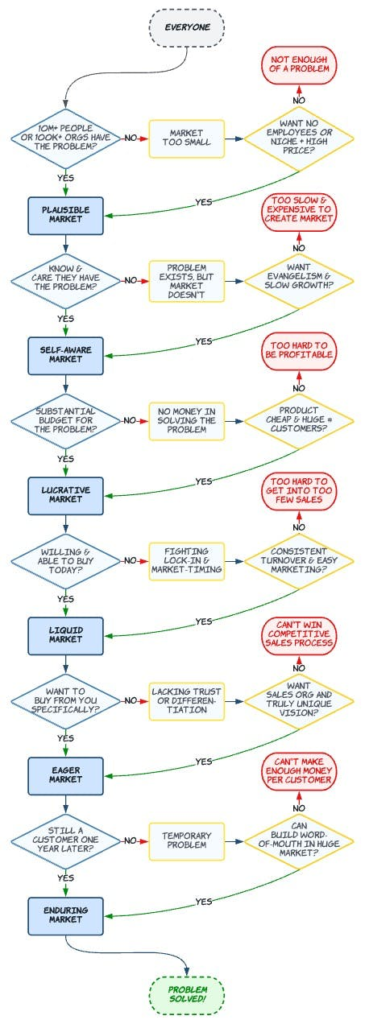Gladwell on how to end well
Welcome to the thirteenth edition of ‘3-2-1 by Story Rules‘.
A newsletter recommending good examples of storytelling across:
- 3 tweets
- 2 articles, and
- 1 long-form content piece
Each would be accompanied by my short summary/take and sometimes with an insightful extract.
Let’s dive in.
🐦 3 Tweets of the week

I loved this visualisation of patents filed by city. China’s dominance took me by surprise. Check out the full image here.

A long one, but good story about the power of messaging, simple visuals (while eschewing text) and preparation for presentations.

Strategy: You need to know what you are saying no to. And you need to write it down.
📄 2 Articles of the week
An interesting contrarian point of view on India’s economic prospects.
Since the industrial revolution nearly 350 years ago, no country has achieved success without two fundamental achievements: good education and an increase in the participation of women in the workforce. These work as a combination.
As women come into the workforce, they have fewer children, they adopt better child-rearing practices, and they devote greater resources to educating the children. The children therefore grow up to be more productive. That cycle perpetuates itself over generations.
Today, India does not have well educated kids and it has an abysmally low labour force participation rate for women.
—
We say we want to receive investments moving out of China. We don’t ask why China has been so successful in becoming the world’s manufacturing hub. The answer lies in a 1983 World Bank report, its first report on China. China had just become a member of the World Bank, having recently come out of its communist phase. Despite the scars inflicted by Communism, the report said, China starts from an extraordinary base of human development. Life expectancies were high, because nutrition levels were good. In a pointed comparison with India, the World Bank said China was miles ahead of India in these metrics.
China had similarly made big strides in girls’ education. You know the expression ‘women hold up half the sky’? It’s a phrase that the Chinese supreme leader Mao Zedong often used, and he lived up to it. Women were active members of the Chinese Communist Party, and they had a large presence in the labour force. I’m not saying Chinese women did not suffer from gender inequities, which they continue to do; but Chinese women have made much more progress than Indian women have.
It is not surprising that the vast bulk of the movement of production out of China is going to Vietnam, where education standards match or exceed those in Western industrialised nations and women have high labour force participation rates..
b. Excuse me, is there a problem? by Jason Cohen
Entrepreneur and investor Jason Cohen has done a neat job in this long form essay – of the various hurdles that an idea has to cross before it can become a successful start-up. I found this flowchart useful:

🎤 1 long-form listen of the week
a. A Treat for the Die Hards (Revisionist History by Malcolm Gladwell)
Storytellers obsess about how to begin their stories. In this episode Malcolm Gladwell along with the comedian Mike Birbiglia discuss how to end one. The highlight of the episode for me was has a portion which features a stunningly good ending from one of Mike’s stand-up comedy shows.
That’s all from this week’s edition.
Photo by Aaron Burden on Unsplash







